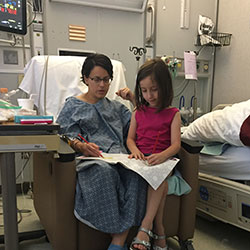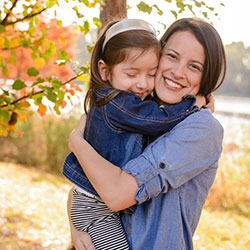Getting a headache isn’t out of the ordinary – getting the worst headache of your life, however, can be. For Katherine Balog, who was taking care of her daughter Asher who had the flu while her husband, Scott, was out of town, slowing down wasn’t quite an option – not even when she experienced a headache one Saturday night that felt like an ice pick had gone through her brain. Despite being nauseous, and having the same headache come and go, Katherine kept pushing on, convinced she was just coming down with the flu like her daughter.
On Wednesday morning, just four days after that initial splitting headache, Katherine went to work and started what would be one of the longest days of her life.
“I was drinking a cup of tea and all of a sudden the cup just fell out of my hand. I had no control over it,” said Katherine. “I remember looking at my co-workers and they were staring at me and looked confused. I tried to talk to them, but I could tell they didn’t understand what I was saying. I knew something wasn’t right.”
Not knowing exactly what was wrong, Katherine’s co- workers rushed her to the Bixler Trauma & Emergency Center at Tallahassee Memorial HealthCare (TMH) and alerted her husband Scott. After being examined by Christopher Shaw, MD and Sam Ashoo, MD, a CT scan confirmed Katherine had a ruptured aneurysm – she was having a hemorrhagic stroke. In less than an hour, she was admitted to the Vogter Neuro Intensive Care Unit (ICU) at TMH and prepped for emergency surgery.
“There were times, mostly in the beginning of the day, when everything was fuzzy. But for the most part, I was completely conscious and aware of what was going on,” said Katherine. “I remember getting ready for surgery and saying a prayer – just praying that I could have my life back and continue to be a mother and wife.”
Within hours, T. Adam Oliver, MD, endovascular neurosurgeon at Tallahassee Memorial HealthCare, performed surgery on Katherine’s brain. Using a catheter that is inserted through a vein near the groin, Dr. Oliver was able to perform an aneurysm coiling – where he identified the specific location of the hemorrhage, coiled it, stabilized the aneurysm and ruled out other sources of bleeding.
Brain aneurysm ruptures like Katherine’s occur often in the U.S. and across the region. One in 50 people across the U.S. have an unruptured brain aneurysm, and a brain aneurysm rupture occurs somewhere in the country every 18 minutes. Of those hemorrhages, nearly 40 percent are fatal – and of those who survive, around two-thirds suffer from permanent neurological deficits. As in Katherine’s case, prior to the worst headache she ever experienced in her life, there are often no warning signs.
“Katherine had a ruptured aneurysm in her middle cerebral artery that we were able to treat quickly. A ruptured aneurysm is typically a devastating event. Katherine is incredibly fortunate," said Adam Oliver, MD.
 Because of the quick actions of Katherine’s co-workers, coupled with the specialized surgeons and state-of-the-art treatment and medical technology offered at TMH, Katherine is functioning today without any neurological deficits. After the surgery, Katherine spent just 14 days recovering and being monitored in the Vogter Neuro ICU, and then was able to return back to work just two months later in August.
Because of the quick actions of Katherine’s co-workers, coupled with the specialized surgeons and state-of-the-art treatment and medical technology offered at TMH, Katherine is functioning today without any neurological deficits. After the surgery, Katherine spent just 14 days recovering and being monitored in the Vogter Neuro ICU, and then was able to return back to work just two months later in August.
Looking back at what their family went through just months ago, Katherine and Scott can’t help but feel grateful for their second chance at life.
“We are so thankful for God’s abundant grace and many blessings, including the gift of life for Katherine so that she can continue to be a loving mother and wife and share her story with others,” said Scott. “We are thankful for Tallahassee Memorial HealthCare, for their vision in establishing world-class, state-of-the-art emergency and neurosurgery centers in our community; for the physicians who utilize their skills and talents to save lives every day; for the care and attention provided by nurses, patient care assistants and housekeeping staff to patients and their loved ones; for volunteers in programs like animal therapy for their invaluable service in providing comfort; and for the chaplains who bring uplifting spiritual support and counsel to the patient bedside.”
Through their experience, Katherine and Scott Balog feel not only immensely grateful, but also a sense of responsibility to support the continued advancement of neurological treatment at TMH.
“I used to always be in a rush, but now I’ve learned to slow down and realize how much of a blessing it is to be here — to be alive,” said Katherine. “I’ve found myself asking how much good can I do since I’m still here? How do I give back to the community and help others?”
In an effort to help support the Tallahassee Memorial Neuroscience Program, the Balogs have created the Balog Family Fund for Stroke and Aneurysm Education & Patient Care – a fund that will bring awareness and education to aneurysms and strokes.
“I think if people understood the prevalence of aneurysms and strokes, then they would have a better sense of urgency,” said Scott. “Not ignoring any unusual symptoms, listening to your body, and taking actions immediately are all key things for people to know. And we really want to help spread that message.”
To learn more about the Balog Family Fund for Stroke and Aneurysm Education & Patient Care, please contact the TMH Foundation at TMHFoundation.ORG or call 850-431-5389.

